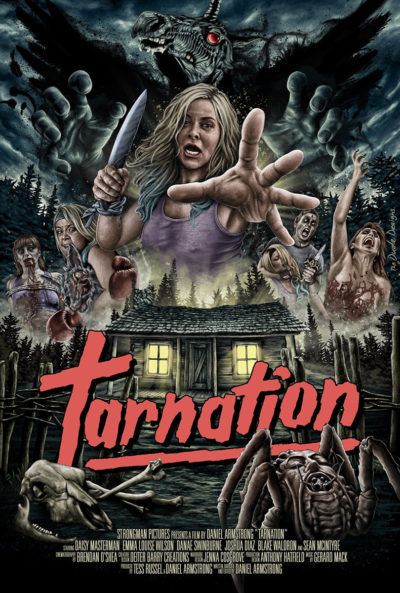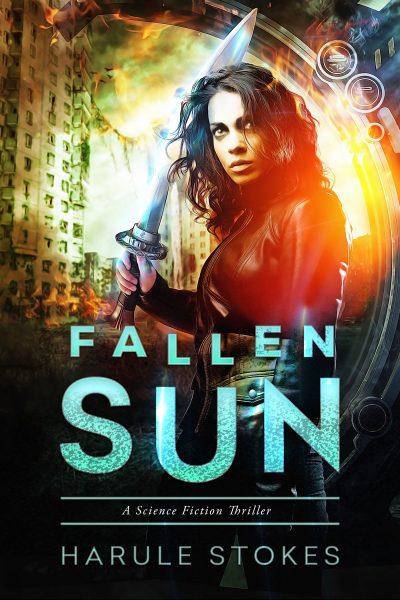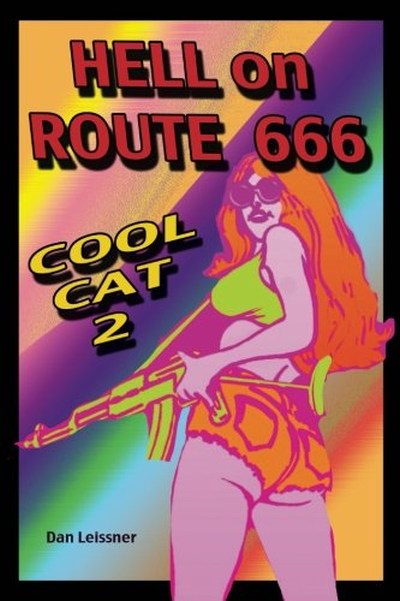★★½
“The Dead Evil.”
 Following on after From Parts Unknown and Sheborg Apocalypse, this is my third encounter with what Armstrong calls “Neo pulp.” All three have strong heroines at their core, which is something I can get behind. But I suspect his approach works best when he builds out his own universe, as in Sheborg. Here, the inspiration is the classic horror of The Evil Dead trilogy (particularly Evil Dead 2), which is a bit of a double-edged sword. You need to have seen those films to get the references – and, in Armstrong’s defense, I suspect most viewers of his work likely will have. The problem, and there’s no escaping this, is Sam Raimi did it better, leaving this feeling almost like an Asylum-style mockbuster. Turning Ash into Ashette and hanging an Evil Dead poster on the wall of your cabin isn’t enough.
Following on after From Parts Unknown and Sheborg Apocalypse, this is my third encounter with what Armstrong calls “Neo pulp.” All three have strong heroines at their core, which is something I can get behind. But I suspect his approach works best when he builds out his own universe, as in Sheborg. Here, the inspiration is the classic horror of The Evil Dead trilogy (particularly Evil Dead 2), which is a bit of a double-edged sword. You need to have seen those films to get the references – and, in Armstrong’s defense, I suspect most viewers of his work likely will have. The problem, and there’s no escaping this, is Sam Raimi did it better, leaving this feeling almost like an Asylum-style mockbuster. Turning Ash into Ashette and hanging an Evil Dead poster on the wall of your cabin isn’t enough.
Most obviously, Masterman isn’t Bruce Campbell. While fine in Sheborg as the sidekick, she doesn’t have the presence necessary to drag the viewer along on her journey to a blood-drenched hell and back. Oscar (Masterman) is a wannabe singer, fired by her band, who heads off to a remote cabin with her best friend and friend’s boyfriend. Of course, anyone who has ever seen any horror movie will be unsurprised when things go wrong, in particular her BFF being possessed by some kind of entity. Though there’s a lot of… stuff going on besides. Said stuff includes a flying demon with a unicorn’s head, a boxing kangaroo, a rap battle, and insects crawling out of places insects were never meant to go. And blood. Lots of blood.
There’s no arguing the energy here: when the film gets going, it pretty much doesn’t stop thereafter. However, I’d have traded a sizeable chunk of that energy for coherence. Or a sense of escalation. Or anything to help negate the feeling this consists of Armstrong and his team throwing whatever ideas they could come up with, on the screen, in the order they came up with them. Some of those ideas are fun, and you marvel at the low budget inventiveness. which makes a hole in the floor with a rug on it, a portal to the netherworld. Others don’t work, outstay their welcome, or have execution so flawed they should have been strangled at birth.
As a result, the energy becomes increasingly wearing on the soul, to the point that Oscar discovering the magic words to restore normality are, “Klaatu Barada Necktie,” provoked a tired eye-roll rather than the intended mirth. As loving recreations go, it’s certainly not bad; however, if I wanted to watch a blood-spattered story about a weekend spent at a cabin in the woods gone horribly wrong, I’d watch The Evil Dead and its sequels. Hopefully, Armstrong can develop something that shows off his unquestionable talent, imagination and ability to squeeze every penny out of the budget, on its own canvas, rather than painting on top of someone else’s masterpiece.
Dir: Daniel Armstrong
Star: Daisy Masterman, Emma Louise Wilson, Danae Swinburne





 The leader of all-girl biker gang the Hellcats is brutally beaten and murdered, by Repo (Kosobucki). Her replacement, Kat (Neeld), tries to get to the bottom of the killing, and take vengeance on the perpetrators. Complicating matters is Repo’s position in the Vipers, another motorcycle club with whom the Hellcats have previously had generally friendly relations. Part of that is due to Kat’s on-again, off-again relationship with their leader, Snake (Kabasinski); he also has the advantage of being cosy with some of the local cops, who divert confiscated drugs back to the Vipers for resale. But was he aware of – or did Snake perhaps even order? – Repo’s actions?
The leader of all-girl biker gang the Hellcats is brutally beaten and murdered, by Repo (Kosobucki). Her replacement, Kat (Neeld), tries to get to the bottom of the killing, and take vengeance on the perpetrators. Complicating matters is Repo’s position in the Vipers, another motorcycle club with whom the Hellcats have previously had generally friendly relations. Part of that is due to Kat’s on-again, off-again relationship with their leader, Snake (Kabasinski); he also has the advantage of being cosy with some of the local cops, who divert confiscated drugs back to the Vipers for resale. But was he aware of – or did Snake perhaps even order? – Repo’s actions? After reading some particularly scathing reviews of this, e.g. “stunningly atrocious”, I was braced for something
After reading some particularly scathing reviews of this, e.g. “stunningly atrocious”, I was braced for something  While not perfect, I think this one will probably end up sticking in my mind longer than most of the books I read. For one, it helps being a stand-alone and complete work, rather than the first of a multi-volume set. While I understand the rationale behind the latter – that’s where the bread and butter of writing income is made – it was refreshing to get a beginning, middle and proper end, without a cliff-hanger or opening for sequels. It was also different in content, rather than being yet another book which drops fantasy creatures like elves or vampires in a contemporary setting. I’ve seen enough of those this year, thankyouverymuch.
While not perfect, I think this one will probably end up sticking in my mind longer than most of the books I read. For one, it helps being a stand-alone and complete work, rather than the first of a multi-volume set. While I understand the rationale behind the latter – that’s where the bread and butter of writing income is made – it was refreshing to get a beginning, middle and proper end, without a cliff-hanger or opening for sequels. It was also different in content, rather than being yet another book which drops fantasy creatures like elves or vampires in a contemporary setting. I’ve seen enough of those this year, thankyouverymuch. This has the potential to be truly bad, and you need to be willing to look past ropey production values, a possibly deliberately shaky grasp of period (unless “Daisy” really was a popular girls’ name in early medieval times…) and uncertainty as to whether or not this is intended to be a comedy. Yet, I have to admire its “everything including the kitchen sink” approach: throwing together elements from genres as disparate as Vikings, zombies, aliens, sword ‘n’ sorcery and female vengeance shows… well, ambition, at the very least.
This has the potential to be truly bad, and you need to be willing to look past ropey production values, a possibly deliberately shaky grasp of period (unless “Daisy” really was a popular girls’ name in early medieval times…) and uncertainty as to whether or not this is intended to be a comedy. Yet, I have to admire its “everything including the kitchen sink” approach: throwing together elements from genres as disparate as Vikings, zombies, aliens, sword ‘n’ sorcery and female vengeance shows… well, ambition, at the very least. Crown International were an independent movie studio, who operated from the sixties through the eighties: we’ve covered some of their work before, such as
Crown International were an independent movie studio, who operated from the sixties through the eighties: we’ve covered some of their work before, such as 
 At the very end, of the characters says to Cat, the heroine, “Will someone PLEASE tell me what this was all about!” I can kinda sympathize with them: I think it’s safe to say this defied expectations, though I must stress, in a good way. It’s close to 12 years since we were
At the very end, of the characters says to Cat, the heroine, “Will someone PLEASE tell me what this was all about!” I can kinda sympathize with them: I think it’s safe to say this defied expectations, though I must stress, in a good way. It’s close to 12 years since we were  We’ve previously written about Pearl Ling Chang’s mad
We’ve previously written about Pearl Ling Chang’s mad  Space freighter pilot Jason (Sheridan) has his craft hijacked, and is forced to crash-land it on a deserted planet. Blinded and alone, things look grim for him, until he’s fortunate enough to be found by android Reyna (Guzzetta). She’s the product of a maverick genius, who took refuge on the planet, but recently died: she needs Jason, as the systems which power her require a human presence in order to operate. And he needs her – in particular, her advanced combat skills – in order to protect him, both from the planet’s hostile fauna, and the hijacker’s pals, who have followed him down to its surface. Yet, is Reyna entirely trustworthy?
Space freighter pilot Jason (Sheridan) has his craft hijacked, and is forced to crash-land it on a deserted planet. Blinded and alone, things look grim for him, until he’s fortunate enough to be found by android Reyna (Guzzetta). She’s the product of a maverick genius, who took refuge on the planet, but recently died: she needs Jason, as the systems which power her require a human presence in order to operate. And he needs her – in particular, her advanced combat skills – in order to protect him, both from the planet’s hostile fauna, and the hijacker’s pals, who have followed him down to its surface. Yet, is Reyna entirely trustworthy? This got off to a frankly rocky start, to the point that a few pages in, this felt like it might become a very rare DNF (Did Not Finish) book. It’s an incredibly clumsy and stilted opening, depicting the internal conversation between Sailor Ray and the demon who inhabits her. Literally, “Why am I reading this?” bad. Still, I persisted: and in the end, the story redeemed itself, though the final third was considerably weaker overall.
This got off to a frankly rocky start, to the point that a few pages in, this felt like it might become a very rare DNF (Did Not Finish) book. It’s an incredibly clumsy and stilted opening, depicting the internal conversation between Sailor Ray and the demon who inhabits her. Literally, “Why am I reading this?” bad. Still, I persisted: and in the end, the story redeemed itself, though the final third was considerably weaker overall.